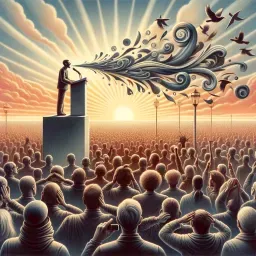”Success is not final, failure is not fatal:
It is the courage to continue that counts“

- Meaning
- This quote highlights the transient nature of both success and failure. Success is never a permanent state; it requires ongoing efforts to maintain and build upon it. Similarly, failure is not a conclusive end but rather a temporary hurdle. The true measure of a person’s character is their courage to persist despite these ups and downs. This resilience is what ultimately drives progress and achievement.
- Allegory
- The determined figure at the crossroad exemplifies the choice and effort required to persist through both success and failure. The green fields on one side represent achievements, filled with life and freedom. On the other side, the rugged terrain and dark storm clouds depict the inevitable challenges and hardships one encounters. The bright horizon in the background signifies hope and the promise of new opportunities, illustrating that despite difficulties, forward movement continues. This visual story underscores that the journey is characterized by the courage to keep progressing, even when faced with the peaks of success and the valleys of failure.
- Applicability
- In everyday life, this phrase can serve as a motivational reminder that neither triumphs nor setbacks define one's journey. Whether you are celebrating success at work, facing challenges in personal relationships, or recovering from a mistake, the essential element is the courage to continue. This mindset can foster perseverance and a positive attitude, encouraging people to keep moving forward regardless of circumstances.
- Impact
- This quote has had a significant cultural impact, frequently cited in motivational speeches, self-help books, and at both corporate and educational events. It serves as an evergreen source of encouragement and is particularly powerful in times of crisis or hardship. By emphasizing the importance of resilience, it has inspired countless individuals and leaders globally to adopt a never-give-up attitude.
- Historical Context
- This phrase is believed to have been coined in the mid-20th century, reflecting the turbulent times of World War II and its aftermath. During these years, the world was in a state of flux, facing the challenges of post-war recovery and the need for resilience.
- Criticisms
- Criticism of this phrase often centers on the idea that it may oversimplify the complexities of success and failure. Some argue that while courage and perseverance are crucial, they are not the only factors that determine success. Societal structures, opportunities, and even luck can also play significant roles. Critics suggest that the phrase might inadvertently place undue pressure on individuals to keep striving, even in situations where doing so may be detrimental.
- Variations
- Variations of this phrase often focus on the same core message of perseverance and resilience but may be framed in culturally specific contexts. For instance, in Japanese culture, the proverb "Fall seven times, stand up eight" similarly underscores the importance of relentless perseverance.
-

I don't give a damn for a man that can only spell a word one way.
-

The true test of a man's honor is his loyalty to his country.
-

I have not yet begun to fight!
-

The arc of the moral universe is long, but it bends toward justice.
-

Freedom is the right to tell people what they do not want to hear.
-

You are entitled to your own opinions, but not your own facts.
-

In any moment of decision, the best thing you can do is the right thing, the next best thing is the wrong thing, and the worst thing you can do is nothing.
-

Good things come to those who wait.
-

Politics is the art of looking for trouble, finding it everywhere, diagnosing it incorrectly, and applying the wrong remedies.
-

Not all those who wander are lost.
-

The true measure of any society can be found in how it treats its most vulnerable members.
No Comments